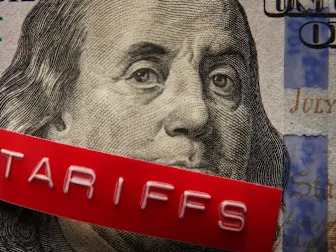Shoppers may soon notice a shift in what’s available on store shelves. New and expanded tariffs on Chinese imports — some climbing as high as 145% — are shaking up supply chains and sending costs skyward.
Learn More: Trump’s Tariffs: Here’s What Economists Think Will Happen After the 90-Day Pause
Advertisement: High Yield Savings Offers
Find Out: Here's the Minimum Salary Required To Be Considered Upper Class in 2025
With China serving as a manufacturing powerhouse for everything from holiday decorations to electronics, the ripple effects are starting to hit U.S. retailers hard. As a result, some familiar products may become harder to find , more expensive, or disappear altogether.
Here’s a breakdown of the seven items likely to be impacted the most by tariffs.
Fast Fashion and Clothing
Budget-friendly clothing from popular online platforms like Shein and Temu have become a go-to for budget-conscious shoppers. Much of their pricing power came from a former trade rule that allowed imports under $800 to bypass duties.
That loophole has now closed, tightening the flow of low-cost apparel into the U.S. Expect to see fewer ultra-cheap fashion finds, including basics like T-shirts, socks and seasonal accessories. With costs rising on the supply side, retailers may reduce inventory or shift focus toward higher-margin items, shrinking selection on the lower end of the price spectrum.
Read Next: Trump Isn’t Ruling Out a Recession This Year — What Could That Mean for Your Wallet?
Toys
Toys are taking a major hit. With nearly 80% of toys sold in the U.S. manufactured in China, tariffs are pushing production costs higher, especially on lower-margin and seasonal products. This could mean fewer options on toy store shelves, particularly as the holiday season approaches.
Smaller toy companies are feeling the squeeze and may scale back operations or even shut down if conditions persist. Prices are likely to increase, and the days of last-minute bargain toy runs might be numbered.
Decorations
From twinkling lights and Christmas ornaments to patriotic flags and party supplies, decorative items are another casualty of the shifting trade landscape. Yiwu, China, is the global hub for holiday decorations, producing roughly 80% of the world’s festive goods. That reliance now spells trouble. Shrinking inventories, delayed shipments and rising costs are starting to show up in stores. Even summer staples like grills, themed tableware and backyard décor could become more expensive or tougher to find.
Back-to-School Supplies
Backpacks, notebooks, pencil cases and other school essentials often operate on just-in-time production schedules, making them especially vulnerable to supply chain disruptions. Retailers are already bracing for leaner inventory in the months leading up to the new school year. Parents shopping for specific styles, colors, or brands might face fewer choices or higher prices during peak back-to-school season . Restocks could take longer than usual, too.
Appliance Replacement Parts
Full-size appliances may remain available, but many of the smaller parts that keep them running — water filters, cords, bulbs and internal components — are already showing signs of scarcity. These items often fly under the radar in supply chain planning and restocking them can be slow. That means longer wait times for repairs and higher costs for service visits. Households relying on regular maintenance for dishwashers, fridges, or washing machines could feel the pinch.
Home Decor and Patio Furniture
Home goods and furniture are another category where tariffs are making waves. Many lighting fixtures, accent pieces and patio sets are sourced or assembled in China, and they’re often shipped in bulk to keep prices low. Now, costs are climbing. Mass-market items that once offered affordable seasonal refreshes might start carrying steeper price tags or vanish from shelves as retailers opt to skip low-margin stock altogether.
Consumer Electronics
Smartphones, tablets, chargers and computer accessories are deeply embedded in global supply chains, with Chinese manufacturing playing a central role. Tariffs on key components and finished products are likely to push prices upward across the board. From premium tech to budget-friendly accessories, electronics are poised to become more expensive. Shoppers may hold off on upgrades or repairs, extending the lifespan of current devices simply because replacing them could cost significantly more.
More From GOBankingRates
This article originally appeared on GOBankingRates.com : 7 Items You Won’t Be Able to Find in Stores Due to China Tariffs


